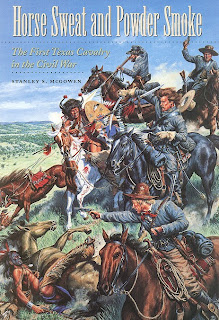Being busy in school at the time, Stanley McGowen's Horse Sweat and Powder Smoke: The First Texas Cavalry in the Civil War (TAMU, 1999) slipped by me when it first appeared. A decent number of modern Texas cavalry unit studies have been published before and since [many of the earlier ones quite pricey], but this one is my favorite to date. Even 15 years later, it's not too late to get a brand new, shrinkwrapped copy, either, as the book remains in print and widely available.
Modern regimental studies of units raised in the Trans-Mississippi and remaining there during their entire service are rare and the First, in its several forms, has the added bonus of having a fascinatingly disparate range of duties. From February 1861, the job of the First Texas Mounted Rifles (a 12-month regiment) was primarily to patrol the Texas frontier and protect settlers from frequent Comanche and Kiowa attacks. When this initial enlistment period expired in spring 1862, four companies formed the nucleus of a cavalry battalion that guarded the coast but also dealt with internal troubles stirred up by pro-Union German immigrants. Officers and men from the old First fought in the Neuces battle but apparently did not directly participate in the prisoner murders that tainted the aftermath. In May 1863, the regiment was reconstituted as the First Texas Cavalry. The Texans spent much of the remaining period of the war on the move safeguarding the essential cross border cotton trade, defending the state from a number of Union amphibious operations (their duty stations ranging up and down the entire coastline between Fort Brown and the Texas-Louisiana border), and campaigning in Louisiana with Confederate forces opposing the Union army's 1863 Texas Overland Expedition and 1864 Red River Campaign.
The study does not include a roster and the demographic analysis of the men that served in the ranks is fairly minimal by today's standards. The large number of German-Americans in the regiment will interest many readers more familiar with stories surrounding the pro-Union element among German-Texan citizenry. McGowen provides detailed mini-biographies of their officers (including that of the talented professional soldier that would eventually lead the regiment, Augustus Buchel) but unfortunately wasn't able to uncover much common soldier source material documenting the source of their Confederate loyalties and what they thought about their unionist neighbors
McGowen does devote a great deal of space in the book to the difficulties of frontier military service in the Confederacy, including how the Texans dealt with scarcities in food, supplies, weapons, horses, equipment, and medical services in camp and on campaign. Horse Sweat and Powder Smoke really is a noteworthy original when it comes to Trans-Mississippi regimental histories. From Indian fighting to border security to suppressing armed internal dissent to defending coastal and overland routes from Union invasion, the variety of roles performed by the men of the First Texas Cavalry almost perfectly encapsulates the entire range of Civil War Texas military experiences.


Drew: I agree that this is a very good regimental of a unit that was unusual in many regards.
ReplyDeleteIt is also amazing that the author is blind. Quite an accomplishment.
Drew,
ReplyDeleteThanks for the recommendation. The only problem is now I'm going to have to eventually buy it.
I'll eventually add it to my other Texas cavalry histories that I have like, 'The Third Texas Cavalry in the Civil War' by Douglas Hale and 'All Afire to Fight:: The Untold Tale Of The Civil War's Ninth Texas Cavalry' by Martha L. Crabb.
Thanks,
Chris
Hi Chris,
DeleteI liked it more than those two. Maybe you will, too.
Drew
my ancestor Samuel C Skidmore and his son from Bee county texas served in the 1st cavalry under col Yager battalion from 1862-64
ReplyDelete